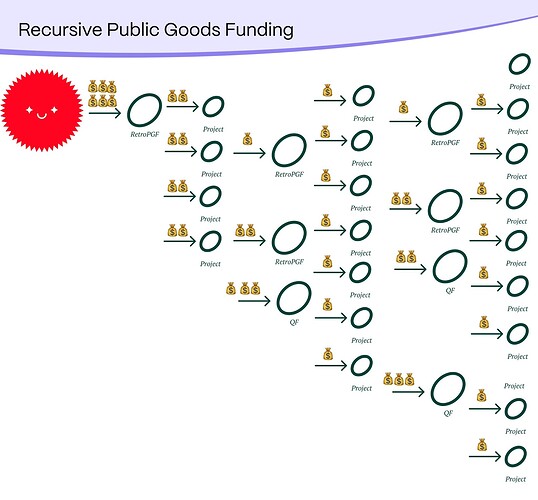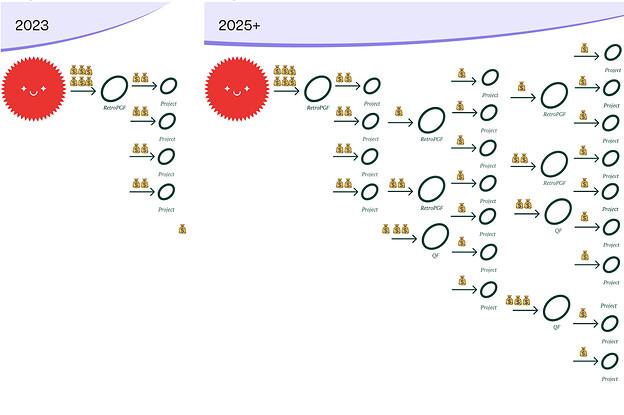The objective of this post is to envision how funding could flow through a network of Public Goods Funding mechanisms.
Here is a high level visual of what this funding could look like:
(Please don’t take this visual too literally - at any row, you could sub out a project for other project(s), or sub out one mechanism for another, or one upstream funding source for another - eg Optimism for Gitcoin for Giveth for CLRFund)
In 2023, tens of millions of $$ flowed through public goods funding mechanisms. [see visuals here].
Two things will change in 2024 though:
- There will be more funding than ever to PGF.
- New easy to use products will come online allowing anyone to do PGF.
At any step of the way in this network … you can…
- Roll your own funding mechanism.
- Run your own RPGF round => http://easyretropgf.xyz
- Run a QF round => Grants Stack | Gitcoin
- Donate to PG => theprotocolguild.eth
- Donate to Giveth => donation.eth
- Donate to CLRFund => 0xFcC41c4614bD464bA28ad96f93aAdaA7bA6c8680
- Donate to Gitcoin => multisig.gitcoindao.eth
As tools like the above make it easier for anyone to run a PGF rounding, we will start to see these flow through multiple levels of funding. Here’s a before/after.
Opportunities ahead:
- There should be as much bottom up curation as possible.
- Example: The farcaster community should decide the distribution of PG funding for farcaster contributions, not the Optimism community
- This will help create pockets of bottom-up governance that makes top-down decisions easier, because you can abstract away capital allocation decisions to subsidiary local communities.
- As more and more communities do this,
- …. there will be more long tail public goods funding + cradle to unicorn public goods funding.
- … it diversifies funding sources + mechanisms, helping us reach impact = profit in a more pluralistic way.
- it creates a gravity well of impact driven talent into the Ethereum ecosystem and positive sum games for those already in the Ethereum ecosystem…
- There’s an opportunity to
- get all the OP chains to run their own rounds
- help web3 communities see that funding their public goods is a sustainable competitive advantage. Over time, this will grow into an arms race to fund public goods.
- work between Gitcoin/Optimism/others to help make it (1) very easy (2) very powerful to run PGF tools.
- Build impact attestations through open standards (eas, hypercerts), creating an emergent web of trust that measures impact throughout web3.
- Build a “web3 grants common app”. such an app would allow people to manage their grant in 1 place + push it to multiple grant programs. saving time and energy, similar to how the common app for college applications works in the US.
Feedback welcome

